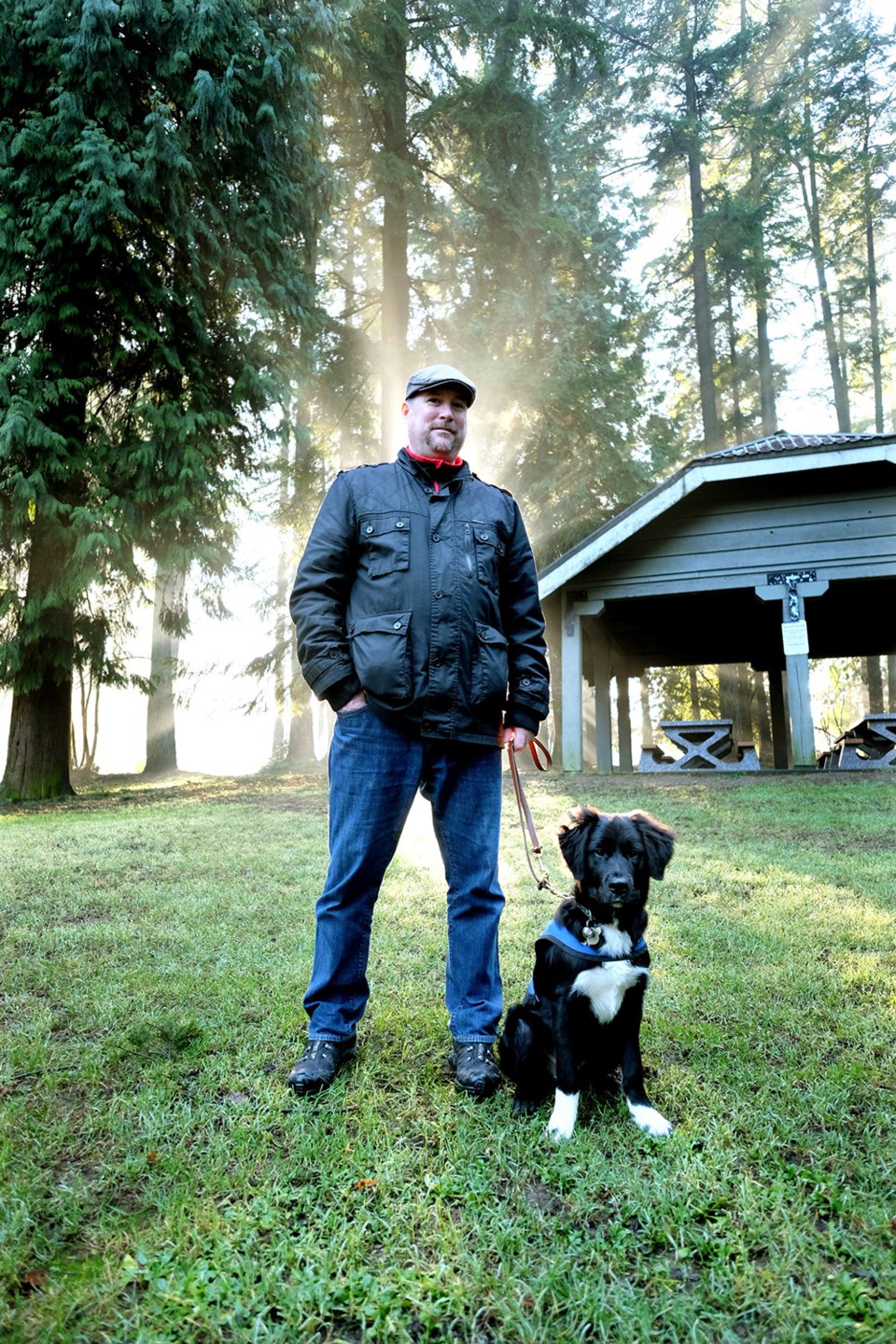For two decades James Simpson and his wife, Joanne, have helped raise pups for British Columbia Guide Dog Services, an agency that provides dogs for either the visually impaired or children with autism.
“We got involved initially because we were looking for a way to give back,” Simpson says during an interview with The Record in Queen’s Park, where he is hanging out with his latest pup, McGregor, an unbelievably calm five-month-old border collie-golden retriever.
Early on, the couple realized how beneficial the pups they raised would be to help others’ mobility and independence. The first dog they raised went to a woman who was in nursing school when she discovered she was going blind. Due to her deteriorating eyesight, the woman was afraid to leave her house. Eventually, the dog the couple raised was sent to live with the woman, who is now a counsellor helping others adjust to the realities of being blind.
“She always says to us that we didn’t give her a dog, we gave her her life back,” Simpson says. “To have that as our first dog was pretty moving to us.”
The pups that don’t become guide dogs will sometimes become supports for children with autism.
The dog can act as a physical anchor for a child if they should bolt. The pup can also help reduce stress and improve social skills.
For those children, “a dog helps bridge the world for the child when they are anxiety-ridden,” Simpson says. The dog also fulfils their connection to another living thing, he adds.
“We have heard from people whose kids haven’t spoken in six years, and you bring a dog into the house and they will start talking,” says Simpson, a screenwriter whose script Armored was made into a full-length feature film starring Matt Dillon.
The dogs can also help children who are a flight risk (sometimes children on the autism spectrum can run without notice) and to provide a social connection to the dog, as well as helping to bridge connections to other children. The dog can act as ice-breaker, making it easier for youngsters on the spectrum to find comfort in often-difficult social settings.
Over the years, Simpson has helped raised eight dogs that went on to be seeing-eye dogs. But not all of the pups have the right calm temperament for being a working dog.
They don’t know if a dog will be a guide dog until it is about a year-and-a-half, Simpson says.
Most of the dogs they breed are Labradors and golden retrievers.
As for the nature of the pups, put the harness on and it’s all business, but when it comes off, “it’s like a party animal running around with a lampshade on their head,” Simpson laughs.
Each dog costs the agency about $30,000 for the duration of their life, which includes vet, spaying or neutering, food, training, and other costs (there is no cost for participants). None of the money for the dogs comes from the government, Simpson says.
It all comes from donours. Those who give $5,000 or more, get to name one of the pups. Simpson and his wife, Joanne, a McBride Elementary teacher, gave a donation and named their dog Ozzy, after a friend of Simpson’s who passed away. Ozzy is now a working dog for a visually impaired man in Abbotsford.
Simpson and his wife were almost turned down as raisers when they applied 20 years ago because they lived in a condo. It took some convincing, but Simpson argued that it was an ideal setting for a pup to be raised in, saying many of the pups would go onto clients who lived in apartments.
“We thought it was great because not everyone lives in a large house, so our dogs get used to the urban environment,” Simpson says.
The couple initially got involved after seeing an ad in the paper. They were looking for a way to volunteer and to help out.
And there is no doubt they have, and no question that the agency needs all the support it can get.
In fact, the demand for their pups is so great that British Columbia Guide Dog Services is currently unable to meet it.
“We are totally swamped with applicants,” Thornton tells The Record.
The agency provides the service for free for its clients, which for the visually impaired. Dogs are given to children, aged four to 10, with autism.
For information on becoming a puppy raiser, visit www.bcguidedog.com.



